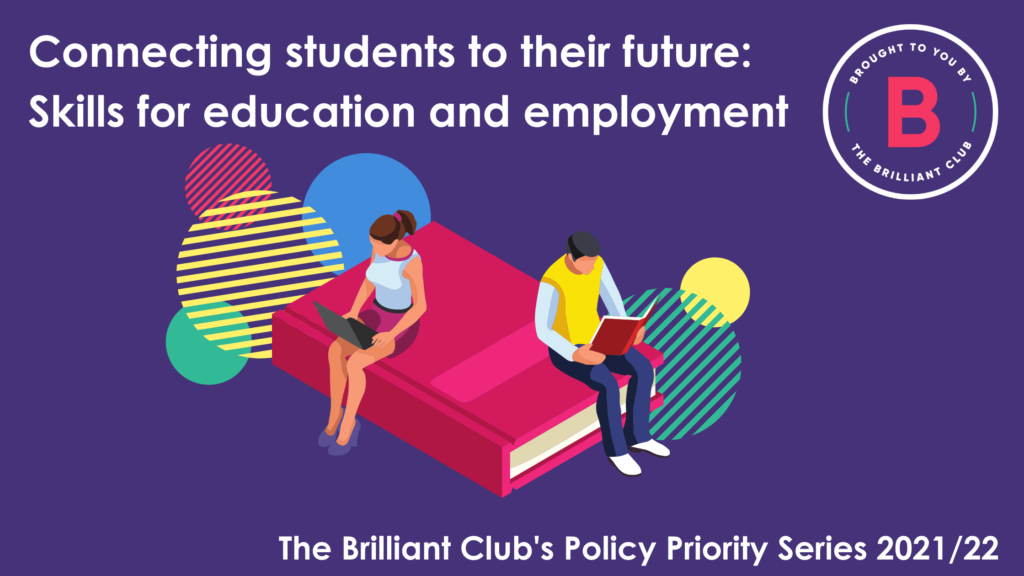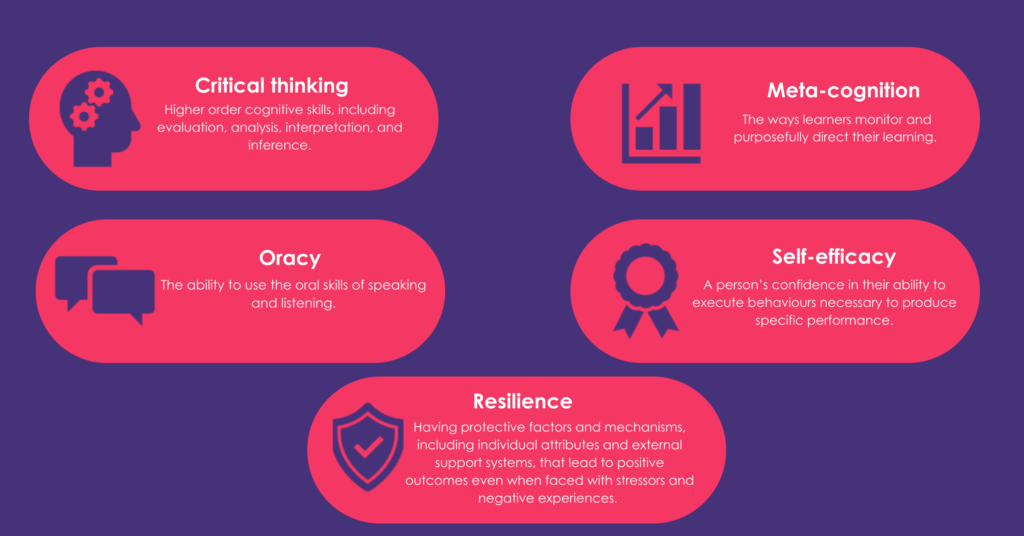Authors: Hannah Thomson (Research & Evaluation Officer), Dr Lauren Bellaera (Research & Impact Director) & Julie Cummings (Public Affairs & Communications Officer)
The attainment gap between the most and least advantaged students is well-documented, with less advantaged students estimated to be around 18 months behind their more advantaged peers by GCSE-level (Education Policy Institute, 2020). We know the pandemic and resulting disruption to education has only worsened this further (Department for Education, 2021).
At The Brilliant Club, we mobilise the PhD community to support students who are less advantaged to access the most competitive universities and succeed when they get there. As part of our research and policy work, we wanted to explore the role of future skills in shaping education and employment opportunities.
In November 2021, we hosted a virtual roundtable bringing together experts from schools, universities, and academia, to discuss the skills that students need to thrive at school, university, and beyond. In this blog, we explore skills for the future and why they are needed now more than ever, and how these skills can be cultivated to support young people to succeed in both education and work in a post-pandemic world.

The phrase ‘skills for the future’ and ‘21st century skills’ have become popular ways to describe competencies that are important both in education and employment. However, these terms are sometimes met with scepticism.
The term ‘21st century skills’ carries an assumption that the skills needed for the future fundamentally differ to the skills needed historically. This is linked to the idea that the future we are preparing for is uncertain and beyond our control, which implies that the ability to adapt is the most valuable skill we can develop.
Based on our roundtable discussions and review of the research literature, we at The Brilliant Club think skills for the future and 21st century skills are meaningful terms, if we reframe some of the assumptions that underpin them:
Therefore, we use the term ‘future skills’ to refer to a set of cognitive, social, and emotional competencies that enable young people to shape their futures through education and employment, which are grounded in shared underlying societal values.
Now we have established what we mean by future skills, we explore which specific competencies need to be prioritised in education, especially in light of the Covid-19 pandemic. Based on the roundtable discussions, which included school teachers and university lecturers, there was a clear consensus that the following skills were important for students of all ages to develop, and were skills that had been impacted by the pandemic:

The effects of the pandemic were especially felt in relation to oracy, particularly for students from less advantaged backgrounds. Disadvantaged children’s spoken language development is significantly lower than their more advantaged peers’ when entering school, and the gap widens to five years’ difference by the age of 14 (Waldfogel & Washbrook, 2010). This has effects for their academic achievement, employment prospects, and mental health, areas which have all been further impacted by Covid-19. A report by I Can found that 1.5 million children in Britain are at risk of not being able to speak or understand language at an age-appropriate level as a result of the pandemic.
When teaching future skills, it is key that they are conveyed explicitly and that students are able to articulate them and use them in alignment with global values – they should be taught, not caught. In the context of the pandemic, the emphasis on education ‘catch-up’ and the difficulty of measuring skills compared to subject knowledge makes this more challenging, as giving student space to learn by doing could be squeezed out by focusing on the curriculum.
We think that successful ‘catch-up’ – or education recovery – needs to focus on both subject knowledge and skills, which is why as part of our Brilliant Tutoring Programme, we explicitly teach and assess skills embedded within curriculum content. Another option is to provide spaces beyond the curriculum to teach skills. For example, in The Brilliant Club’s Scholars Programme, students develop critical thinking skills and reflect on their abilities by engaging in a series of university-style tutorials and assignments, building their confidence in themselves.
For teachers, being aware of what skills students already possess but might not be able to articulate in educational contexts, such as in university applications, is important. One example given in the roundtable was from work with young carers. They demonstrated high levels of resilience developed from caring responsibilities but struggled to recognise or articulate this skill in an educational setting, for example in a personal statement or job application. This may be exacerbated by the inconsistency in the language used to describe skills in school, home, university, and employment settings, so students do not ‘know what they know’.
Throughout the pandemic, young people have been developing new skills in response to a huge challenge, but disadvantaged students in particular may be less able to express what they know and more likely to see the challenges they faced as ‘normal’, and the skills learnt as unremarkable. Schools and universities can play a valuable role in empowering students to recognise and articulate the skills they have, to open up future opportunities.
The importance of cognitive, social, and emotional skills cannot be understated and should form a core part of curriculum and beyond the curriculum learning. This is because explicitly teaching skills such as critical thinking, meta-cognition, and oracy will further strengthen students’ understanding and application of curriculum subject knowledge. Moreover, additional enrichment activities provide space for focused skill development and help to promote cognate skills, including self-efficacy and resilience.
Throughout our roundtable, the theme of connections strongly emerged. In particular, we talked about the following kinds of connections in relation to teaching future skills:
Many thanks to the roundtable attendees who contributed the ideas explored in this blog: Chris Bayes, Claire Rodin, Claire Ungley, Dr Gideon Dishon, Paulette Williams, Rebecca Earnshaw, Dr Sonia Ilie, Susie Whigham, Tom Howells, and Zahra Boudalaoui-Buresi.